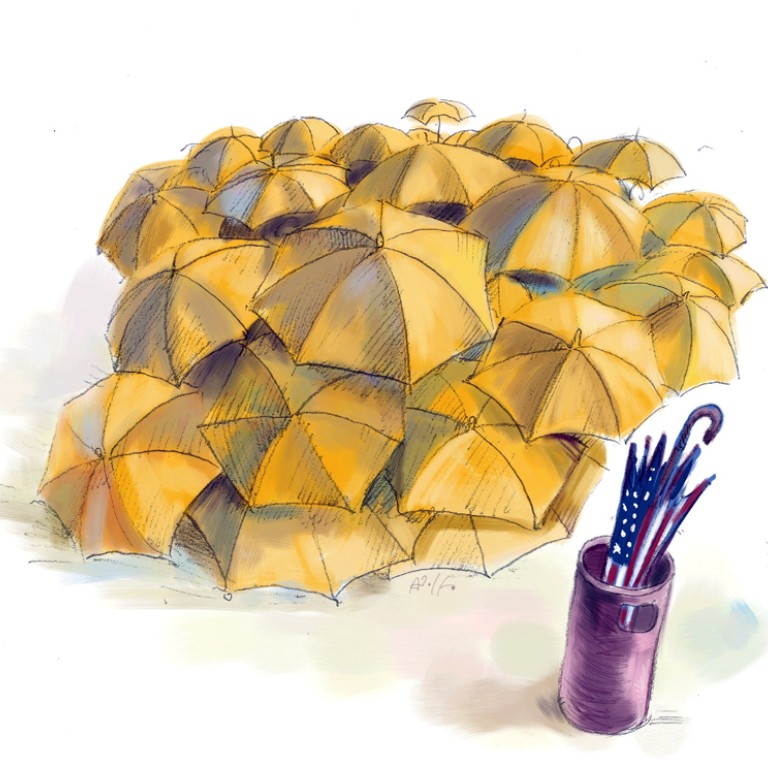
Why influencing Occupy movement is not in America's best interest
Junfei Wu says US influence on Hong Kong's protests may harm America's national interests, by weakening reformist Xi Jinping's hold on domestic power and thus endangering China's peaceful rise
When we think about the origins of the Occupy Central movement in Hong Kong, the US National Endowment for Democracy - and its subsidiary the National Democratic Institute - should be considered one of the originators of the student protests in the special administrative region. The organisation means to promote US national interests, but the truth is that its actions could put the US in great peril.
Hong Kong was a British colony with a successful track record of amassing great wealth that captured the attention and imagination of the world, but London never attempted to introduce democracy. It is ironic that Hong Kong today is more democratic than it was during its time under British rule. The first elements of local democracy were only introduced after the agreement to return Hong Kong to China was signed.
The prevailing wisdom is that the Occupy Central movement is in line with US President Barack Obama's "pivot to Asia" strategy. The discontented students, who admire American values of representative democracy, a multiparty system, local self-governance and the like, are challenging Beijing's authority, and paralysing Hong Kong's central business and governmental district. It seems as if this may enhance US soft power, showing to the world that the Americans rule Hong Kong through their ideas, and some students here are willing to be vanguards of Washington's rebalancing strategy in Asia.
Yet, in reality, the movement may bring damage, if not disaster, to America's China policy. The idea of universal suffrage has been sold to the public on the premise that the Communist Party would not suppress the movement by force, and that the party's restraint would enable the democrats to assume power in Hong Kong.
The plan has obviously ignored domestic politics in mainland China, in particular the case of Zhou Yongkang , the first Politburo Standing Committee member, either retired or sitting, to be investigated over corruption and abuse of power since June 1981. Undoubtedly, a large number of his followers and supporters are also under investigation and will be charged in the near future.
Unsurprisingly, such anti-corruption reforms have been put on hold because of the Hong Kong crisis, and the campaign will not gain full momentum again until the party gets Hong Kong's house back in order.
The danger is that corrupt politicians within the party have been waiting for a chance to fight back. If riots break out in Hong Kong, the authority of President Xi Jinping would be correspondingly reduced and those hardliners will take over. To establish and then increase their legitimacy, they will opt for flawed, aggressive policies, rather than the "new type of great power relations" between the US and China, a strategic concept promoted by Xi.
Questions of foreign policy are hotly debated in China, and the current leadership team has been walking a tightrope to strike a balance between the hardliners and softliners. The aim of Obama's "pivot" is to ensure China's peaceful rise, but if the hardliners win in China's domestic politics, the increasingly powerful People's Liberation Army will take on the US military in the Asia-Pacific region.
I am not convinced the Obama administration's policy is to see China trapped in chaos by the Occupy Central movement in Hong Kong because Washington greatly needs China's support to maintain the US-led unipolar international order.
Western sanctions against Russia seem to have been put in place as warning messages to President Vladimir Putin, rather than to the Russian government per se, amid fears that Chinese and Russian leaders may try to turn the Shanghai Cooperation Organisation into a second Warsaw Pact. The unease of pulling down the Pax Americana by antagonising both China and Russia at the same time has made the US determined to avoid direct, major clashes with China at almost any cost.
Islamic State has emerged as a deadly threat to the regional order in the Middle East under Pax Americana. Washington is not expecting China to join the US-led military actions against IS, but needs its diplomatic support. US National Security Adviser Susan Rice has already requested China's support in forming a coalition of nations battling the extremists.
Ironically, the decline of US influence in Iraq is probably one factor leading to continued rapid Chinese expansion in the Middle East - a huge market for China's weapons of mass destruction, alongside consumer goods from Chinese online marketplaces like Alibaba.
In last year's fourth quarter, China became the world's largest oil importer, which tipped the balance of power in the Middle East away from the US. Oil-rich nations, such as Saudi Arabia, Kuwait and Iraq, will become more dependent on the Chinese economy, and it is hard to imagine them not accommodating China's interests regarding such weapons.
Therefore, Obama needs to continue to support the reformist Xi in his efforts to develop a society based on rule of law, and to achieve progress through top-down reform. The Communist Party can be successfully transformed into a Confucian organisation and the people may see elected governors and selected party secretaries, which would show the values of both Confucianism and liberal democracy.
China does not have to be an enemy of the US, so, please, keep out of Hong Kong's affairs.
